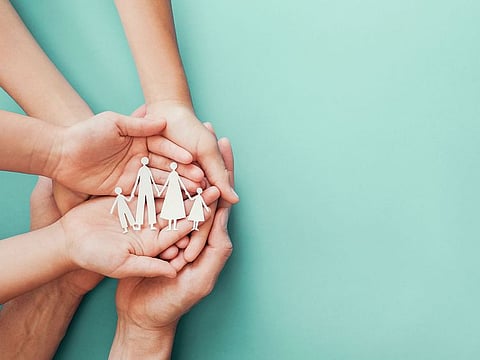8 questions you must not ask adoptive parents
Asking about the ‘biological mum and dad’ is not only insensitive, but also cruel

There are certain times in a parenting journey that you come across people more inclined to overstep. For parents who’ve decided to adopt, curiosity claims boundaries and soon so-called well-wishers think nothing of asking intrusive, hurtful questions – without even realising that they are being insensitive. We asked three mums who adopted kids what are the most irksome questions they’ve been asked over the years. These are the top eight.
1. ‘What are the costs? What is the paperwork you needed?’
Indian expat Rima B., who requested that only her first name be used, says: “Questions from others regarding the adoption process or about the identity of the child are very painful for adoptive parents. This is because the adoptive parents forget in a few days that the child is adopted and not biological.”
2. ‘What is the child’s background?’
Russian expat Evgeniia Spitsyna, who adopted her second child, explains that people seem to be very concerned – and curious - about the adopted child’s genes. “This myth is fear driven. People fear that a child from an asylum might not be a good fit because many of these kids come from financially and emotionally struggling families. I know that parents pass on traits or characteristics such as appearance, health issues and even some abilities. Luckily, genes that result in unkind or unhappy people do not exist and besides biology, it’s the family and environment that affects a personality.
“You may like the book ‘Biology of Belief’, by Dr Bruce H Lipton, which says: ‘Just like a single cell, the character of our lives is determined not by our genes but by our responses to the environmental signals that propel life. We are not victims of our genes, but masters of our fates, able to create lives overflowing with peace, happiness, and love.’”
3. ‘Where are the biological parents, siblings?’
She explains that these are private questions that only the child has a right to raise. “It goes beyond saying that private information must stay confidential. It is illegal to disclose any personal information to third parties,” she says.
4. ‘You are doing a great job’
It’s like implying that child rearing in the case of adoption is ‘a good deed’. Rima B. says the world should accept it as something as natural as giving birth to a baby.
5. ‘It’s great – you didn’t gain weight/get stretch marks, etc.”
Amina, whose name has been changed upon request, recalls a colleague coming up to her days after her maternity leave – around the same time as Amina adopted – only to complain about her pregnancy. She says: "She told me, ‘I’ve gained a lot of weight, but you are lucky, because you are a ready-made mum’.” It not only dismisses a person’s trials and tribulations but also implies that it’s somehow easier to adopt than give birth. Many people who decide to adopt do so because of infertility, and such statements only cause pain.
6. ‘You would have been more attached to a biological child’
Amina explains that when she had to return to the UAE and leave her child with her mother for a bit, a family member remarked rather callously: “You can leave him because you didn’t give birth to him.” Years on, she is still perplexed about this statement. “There may be a number of reasons for a parent having to leave their child with a relative, where does biology come into it?” she wonders.
7. ‘Can you not have biological children? Or do you want to have ‘your own kids’?
These questions are nobody’s business and will serve no purpose other than to antagonise. “Some people assume that we adopted a child because of some health issues as a couple. We had different reasons, but I am not willing to discuss health matters anyway,” says Spitsyna.
Amina adds: “Some people conceive after adoption, so some people think that if you’ve gone in for adoption, it’s because you want to have your own ‘biological child’. We didn’t even try for a child because we didn’t want to be unfair to the adopted one. But it’s also sensitive, people should not ask these questions.”
8. ‘What kind of trauma has the child been through?’
“I was asked a couple of times about that,” recalls Spitsyna. “The whole experience of being abandoned or withdrawn from a biological family is tremendously traumatic for a child. And that’s when abusive behaviour isn’t in the picture – if it is, the horror takes on a new tinge. It can be discussed within the family or with a therapist only. A strong no to this question.”
Have a topic you'd like us to discuss? Write in to parenting@gulfnews.com



